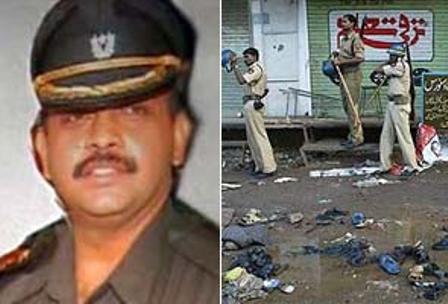By Muslim Mirror
The Bombay High Court dismissed a plea filed by Lieutenant Colonel Prasad Purohit seeking discharge from the 2008 Malegaon bombing case on Monday.
If the contention of the appellant that he was directed to perform an official duty to gather information regarding ‘Abhinav Bharat’ is to be accepted then the question remains to be answered that, why he did not avert the bomb blast in the civilian locality of Malegaon which caused loss of life of six innocent persons and severe to grievous injuries to about 100 persons,” the bench said.
According to the verdict, Purohit did not act in the course of his official duties when he participated in a bomb explosion that killed six people.
It was also stated that, despite being a serving Commissioned Officer of the Indian Armed Forces, Purohit was never given authorization by the government to launch the Abhinav Bharat organisation.
“Appellant (Purohit) was also not permitted to collect funds for the said organisation and to disburse it to procure weapons and explosives for their unlawful activities. Appellant is the key conspirator in the present crime,” the bench said.
Purohit was also stated to have actively participated in meetings that were organised and held with other co-accused individuals in order to achieve their shared goal of engaging in illegal activities.
Purohit’s main defence in his appeal was that the Indian Army did not have the authority to punish him because he was only performing his official duties in accordance with section 197(2) of the CrPC. The National Investigation Agency said that because his actions did not constitute the performance of his duty, no penalty was necessary.
Purohit was arrested in the case by the Maharashtra Anti Terrorism Squad (ATS), and the case was moved to the National Investigation Agency (NIA) after the formation of the NIA.
Nine years after his incarceration, the Supreme Court granted Purohit bail in 2017.
On November 29, a division bench of Justice Ajey S Gadkari and Justice Prakash D Naik verdict its decision on Purohit’s plea.
Purohit had filed an appeal against the trial court’s decision to deny his discharge request, claiming that the Central government had not taken the necessary steps to punish a serving Army commander.
Purohit and six others, including BJP MP Pragya Singh Thakur, are on trial in the case, and charges have been filed under different provisions, including the Unlawful Activities (Prevention) Act (UAPA).
A motorcycle-mounted explosive device detonated on September 29, 2008, in Malegaon, a communaly sensitive town in Maharashtra’s Nashik region, killing six people and injuring more than 100.
The LML Freedom motorcycle that was used for the blast during Ramzan, the holiest month of the Islamic calendar, was allegedly registered in Thakur’s name, according to the NIA. Despite being an Army officer, Purohit launched the Abhinav Bharat organisation in 2007 with the intention of transforming India into a Hindu Rashtra, according to the prosecution.
“They wanted to form a Government in exile. They were dissatisfied with the Constitution of India and had wanted to prepare their own constitution,” the prosecution said in the charge sheet.
The agency has also claimed that Purohit was in charge of obtaining RDX from Kashmir and that a talk about a bomb detonation had occurred in one of the sessions.
In the detailed judgement, the HC noted that in dismissing the discharge motion on the grounds that Purohit’s claimed offence did not have a sanction under section 197(2) of the CrPC, the special court had not erred in taking cognizance of it.
“After minutely perusing entire record we are of the considered opinion that, the offence/s alleged against the Appellant under Section 120-B r/w 302 and other related sections of the Indian Penal Code and under the provisions of UAP Act, of commission of murder of six persons and causing serious to grievous injuries to about 100 persons is nothing to do with his official duty. It has nothing to do or related in any manner with the discharge of the official duty of the Appellant,” said the court.
“The said act is not in colour of his office, but totally unconnected with his official duty. According to us, there is no reasonable connection between the offence alleged against the Appellant and his official duty…. Therefore no question at all of according sanction under Section 197 of Cr.P.C. to prosecute Appellant arises. The trial Court therefore has not committed any error while taking cognizance of the offence alleged against the Appellant and rejecting his Application for discharge on that ground”. it added.






